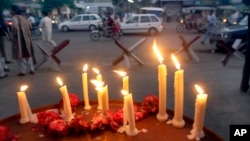Unknown gunmen in central Pakistan have killed a prominent local leader of the minority Ahmadi community, a day after a new report spoke of increasing violence against what is referred to as the country’s most persecuted religious sect.
Police and community spokespeople said Malik Saleem Latif, a lawyer by profession, was on his way to a court with his son on their motorbike Thursday in the town of Nankana Sahib when attackers ambushed them and fired at them from behind.
The slain lawyer was the area head of the Ahmadi community and a relative of Pakistan’s first Nobel laureate, Professor Abdus Salam, who fled the country in 1974 and lived in Britain to protest enactment of a new constitutional amendment declaring Ahmadis as non-Muslims.
The violence came as the Ahmadi sect, in its annual report released Wednesday, documented an unprecedented increase in deadly attacks against its members and worship places across Pakistan in 2016.
“The year ended under great stress and strain for the beleaguered community. Most of the vicious acts took place in the Punjab [province],” the report said.
Thursday’s attack also occurred in the province, the country’s most populous and the political power base of Prime Minister Nawaz Sharif and his ruling Pakistan Muslim League-N.
Codified discrimination
Despite calls for canceling the discriminatory laws against the community, legislation was introduced in 1984 that banned Ahmadis from calling themselves Muslims and building their mosques in the country.
The minority group in predominantly Sunni Muslim Pakistan, believes a prophet (Ghulam Ahmad) followed the Prophet Mohammed, who founded Islam. But that view runs counter to the Muslim religion's central belief of Mohammad being the last of God's messengers.
Last December, thousands of Islamists stormed the only Ahmadi mosque in a village in Punjab and desecrated the sanctity of the worship place. The attack prompted authorities to call in troops and paramilitary soldiers to disperse the protesters.
Pakistani authorities later locked the worship place to deter more attacks and have since ignored calls from the Ahmadi community to reopen the mosque to allow its members to resume religious activities.
Pakistan’s other religious minorities, particularly Christians, also frequently complain of being targeted by radical Muslims and falsely accused of blasphemy, charges that carry the death penalty.
In the latest such incident reported in local media Thursday, a prosecutor allegedly told a group of under trial Christian suspects that he “can guarantee their acquittal" if they renounce their faith and embrace Islam.
Rights activist Joseph Franci, who is providing the accused legal assistance in the case, told reporters that during a recent hearing the prosecutor gathered the suspects outside the court and made the offer.
An anti-terrorism court is trying the group of at least 40 Christians for allegedly participating in an angry mob lynching of two Muslim men shortly after a deadly twin suicide bombing of two churches two years ago in Lahore.
Prosecutor Syed Anees Shah is reported to have conceded that he made the offer.




